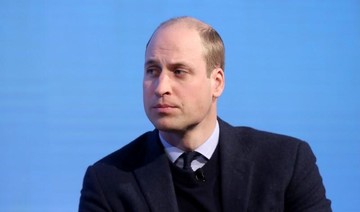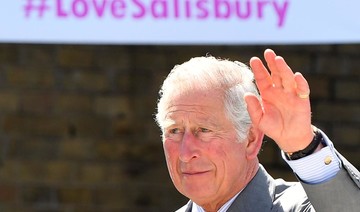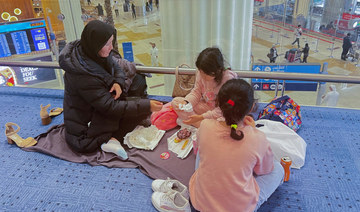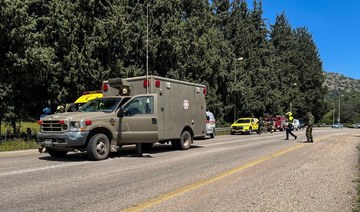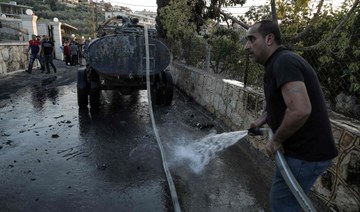JERUSALEM: Prince William is set to arrive in Israel and the Palestinian territories this week for the first official visit of a member of the British royal family, ending the monarchy's decades-long mostly hands-off approach to one of the world's most sensitive regions.
Though the trip is being billed as non-political, and places a special emphasis on technology and joint Israeli-Arab projects, the Duke of Cambridge will also be meeting with the Israeli and Palestinian leaders and visiting landmark Jerusalem sites at the heart of the century-old conflict.
The prince kicks off his Middle East visit Sunday in Jordan where we will meet refugees from the civil war in neighboring Syria and tour the famous archaeological site at Jerash, where his wife, the former Catherine Middleton, once visited when her family lived in Jordan.
On Monday he will arrive in Israel and stay in Jerusalem's King David Hotel, the elegant British-era edifice. From there he will visit coastal Tel Aviv, Israel's financial and cultural capital, and Ramallah in the West Bank, seat of the Palestinian autonomy government. On the docket are scheduled meetings with young entrepreneurs, visits to Israel's vibrant tech and media sectors and meetings with young Jewish and Arab football players.
Kensington Palace, William's official residence, said the visit was aimed "to meet as many people from as many walks of life as possible — and use the spotlight that his visit will bring to celebrate their hopes for the future."
But politics have already seeped into the agenda. The royal itinerary mentioned Jerusalem as being part of "the Occupied Palestinian Territories," angering Israeli politicians. Jerusalem Affairs Minister Zeev Elkin — who is running for mayor of the city in this year's elections — called the reference a "distortion" that cannot "change reality."
Israel captured east Jerusalem from Jordan in the 1967 Mideast war and annexed it in a move not internationally recognized. Israel considers the city, home to holy sites sacred to Jews, Christians and Muslims and the emotional epicenter of the conflict, as an inseparable part of its capital. The Palestinians claim east Jerusalem as a future capital.
Britain has deep roots in the region, having governed Palestine from 1920 to 1948 under a League of Nations mandate. But it has since taken a back seat to the United States in matters of mediating war and peace efforts. The royal family has mostly steered clear of politics.
One way of doing so has been to avoid any official visits. William's father, Prince Charles, attended the 2016 funeral of former Israeli President Shimon Peres but in a private capacity. During that trip, the heir to the throne paid a low-key visit to the grave of his grandmother, Princess Alice. William will also visit her final resting place in Jerusalem's Church of St. Mary Magdalene above the Garden of Gethsemane on the Mount of Olives.
The prince will also visit the Yad Vashem Holocaust memorial in Jerusalem, where his great-grandmother is recognized as a Righteous Among the Nations for her role in rescuing Jews during the Holocaust.
Princess Alice, the mother of Prince Philip, the Duke of Edinburgh, hid three members of the Cohen family in her palace in Athens during the Nazi occupation of Greece in World War II. Thanks to her, the Cohen family survived and today lives in France. The princess died in 1969 and in 1988 her remains were brought to Jerusalem. In a 1994 visit to Yad Vashem, Prince Philip planted a tree there in her honor.
Unlike his father and grandfather, Prince William will be arriving in Jerusalem at the request of Her Majesty's government. As such, he'll be meeting with Israeli President Reuven Rivlin, Israeli Prime Minister Benjamin Netanyahu and Palestinian President Mahmoud Abbas. Both sides seem to be looking forward to the first-ever royal visit.
Though William is not expected to comment on the long-standing conflict and stalled peace talks, his visit is being lauded by Palestinians as recognition of their occupied status.
In Israel, many are excitedly awaiting the pomp and pageantry that accompanies the visit of the second in line to the throne. At the King David Hotel — the site of a lethal bombing by Jewish nationalists in 1946 against the British administrative headquarters that left 91 dead during the lead-up to Israel's fight for independence — preparations are already underway. Prince Charles also stayed at the hotel and his signature is among those of many dignitaries adorning the walkway into the lobby of the hotel.
Sheldon Ritz, the hotel's director of operations, said he has yet to receive the prince's preferred menu but will encourage his staff to have him try the local cuisine of homemade hummus, tahini and falafel.
"I'm sure he'll love that and we're bringing in the best quality tea from England and we're going to offer scones and clotted cream and strawberry jam. So hopefully they'll have a bit of England here as well," he said.
Ritz said the staff was also instructed about the proper etiquette regarding the royal guest.
"You have to bow your head, you can't initiate any handshakes. The prince, if he wants to shake your hand, he'll initiate it and you say: 'Your royal highness,'" he explained. "Every time you meet him after that it's 'sir' ... I'll do the orientation of the suite and I'll try to be as diplomatic as possible. Not too much small talk."
Palestinians, Israelis await Prince William's inaugural royal Mideast visit
Palestinians, Israelis await Prince William's inaugural royal Mideast visit
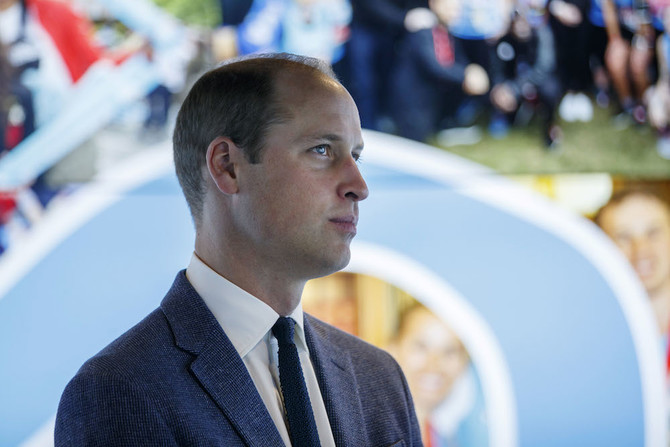
- The prince kicks off his Middle East visit Sunday in Jordan where we will meet refugees from the civil war in neighboring Syria
- Kensington Palace said the visit was aimed "to meet as many people from as many walks of life as possible"
Israeli missiles hit site in Iran, ABC News reports

WASHINGTON: Israeli missiles have hit a site in Iran, ABC News reported late on Thursday, citing a US official.
Commercial flights began diverting their routes early Friday morning over western Iran without explanation as one semiofficial news agency in the Islamic Republic claimed there had been “explosions” heard over the city of Isfahan.
The incident comes as tensions remain high in the wider Middle East after Iran’s unprecedented missile-and-drone attack on Israel last weekend. Most of the drones and missiles were downed before reaching Israeli territory.
Dubai-based carriers Emirates and FlyDubai began diverting around western Iran about 4:30 a.m. local time. They offered no explanation, though local warnings to aviators suggested the airspace may have been closed.
The semiofficial Fars news agency reported on the sound of explosions over Isfahan near its international airport. It offered no explanation for the blast. However, Isfahan is home to a major air base for the Iranian military, as well as sites associated with its nuclear program.
Iran’s government offered no immediate comment.
Isfahan is some 350 kilometers (215 miles) south of Iran’s capital, Tehran.
Iran told the United Nations Security Council on Thursday that Israel “must be compelled to stop any further military adventurism against our interests” as the UN secretary-general warned that the Middle East was in a “moment of maximum peril.”
Israel had said it was going to retaliate against Iran’s April 13 missile and drone attack.
Hamas slams US veto of Palestinian UN membership bid

PALESTINIAN TERRITORIES: Palestinian militant group Hamas condemned on Friday the US veto that ended a long-shot Palestinian bid for full United Nations membership.
“Hamas condemns the American veto at the Security Council of the draft resolution granting Palestine full membership in the United Nations,” the Gaza Strip rulers said in a statement, which comes amid growing international concern over the toll inflicted by the war in the besieged Palestinian territory.
The veto by Israel’s main ally and military backer had been expected ahead of the vote, which took place more than six months into Israel’s offensive in Gaza, in retaliation for the deadly October 7 attack by Hamas militants.
Twelve countries voted in favor of the draft resolution, which was introduced by Algeria and “recommends to the General Assembly that the State of Palestine be admitted to membership of the United Nations.” Britain and Switzerland abstained.
Gazans search for remains after deadly Rafah strike

An Israeli strike hit the home where a displaced Palestinian family was sheltering in the southern city of Rafah, relatives and neighbors told AFP as they scraped at the soil with their hands.
Al-Arja said the blast killed at least 10 people.
“We retrieved the remains of children and women, finding arms and feet. They were all torn to pieces.
“This is horrifying. It’s not normal,” he said, hauling concrete and broken olive branches from the wreckage. “The entire world is complicit.”
Soon after the war began on Oct. 7, Israel told Palestinians living in the north of Gaza to move to “safe zones” in the territory’s south, like Rafah.
But Israeli Prime Minister Benjamin Netanyahu has since vowed to invade the city, where around 1.5 million people live in shelters, more than half the territory’s population.
“How is Rafah a safe place?” said Zeyad Ayyad, a relative of the victims. He sighed as he cradled a fragment of the remains.
“I heard the bombing last night and then went back to sleep. I did not think it hit my aunt’s house.”
The search for remains was long and painful. The strike left a huge crater and children picked through the rubble while neighbors removed debris, tarpaulin, a pink top.
“We can see them under the rubble and we’re unable to retrieve them,” Al-Arja said.
“These are people who came from the north because it was said the south is safe.”
“They struck without any warning,” he said.
In a separate strike on the house in Rafah’s Al-Salam neighborhood overnight on Tuesday, rescue crews recovered the corpses of eight family members, including five children and two women, Gaza’s civil defense service said.
“An Israeli rocket hit a house of displaced people,” said resident Sami Nyrab.
“My sister’s son-in-law, her daughter, and her children were having dinner when an Israeli missile demolished their house over their heads.”
Dubai clears up after epic rains swamp glitzy city
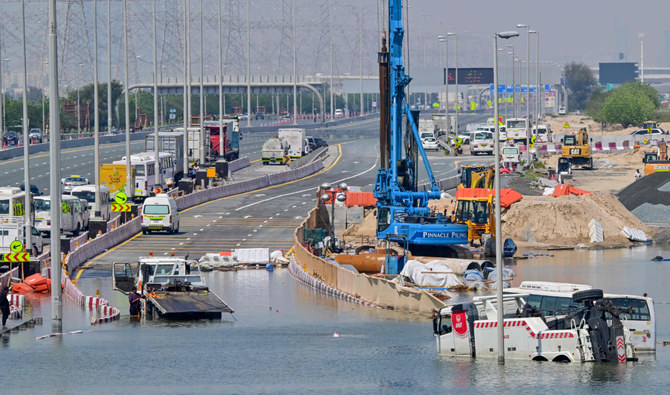
- The rains were the heaviest experienced by the UAE in the 75 years that records have been kept
DUBAI: Dubai was busy on Thursday clearing its waterlogged roads and drying out flooded homes two days after a record storm deposited a year’s worth of rainfall in a day.
Dubai International Airport, a major travel hub, struggled to clear a backlog of flights, and many roads were still flooded in the aftermath of Tuesday’s deluge.
The rains were the heaviest experienced by the UAE in the 75 years that records have been kept.
They brought much of the country to a standstill and caused significant damage.
Flooding trapped residents in traffic, offices, and homes.
Many reported leaks at their homes, while footage circulated on social media showed malls overrun with water pouring from roofs.
Traffic remained heavily disrupted.
A highway through Dubai was reduced to a single lane in one direction, while the main road connecting Dubai with Abu Dhabi was closed in the Abu Dhabi direction.
“This was like nothing else. It was like an alien invasion,” said Jonathan Richards, a Dubai resident from Britain.
“I woke up the other morning to people in kayaks, pet dogs, pet cats, and suitcases outside my house.”
Another resident, Rinku Makhecha, said the rain swamped her newly renovated house, which she moved into two weeks ago.
“My entire living room is just like ... all my furniture is floating right now,” she said.
In Dubai’s streets, some vehicles, including buses, could be seen almost entirely submerged in water.
Long queues formed at petrol stations.
Dubai Airport had not resumed normal operation after the storm flooded taxiways, forcing flight diversions, delays, and cancellations.
Dubai Airport Chief Operating Officer Majed Al Joker told Al Arabiya TV he expected Dubai International Airport to reach 60 to 70 percent capacity by the end of Thursday and full operational capacity within 24 hours.
The airport struggled to get food to stranded passengers, with nearby roads flooded and overcrowding limited access to those who had confirmed bookings.
While some roadways into hard-hit communities remain flooded, delivery services across Dubai, whose residents are used to ordering everything at the click of a mouse, slowly began returning to the streets.
Following Tuesday’s events, questions were raised about whether cloud seeding, a process that the UAE frequently conducts, could have caused the heavy rains.
A UAE government agency overseeing cloud seeding — manipulating clouds to increase rainfall — denied conducting such operations before the storm.
President Sheikh Mohammed bin Zayed Al-Nahyan said in a statement that he had ordered authorities to assess the damage and support families impacted by the storm.
Dubai’s Crown Prince Sheikh Hamdan bin Rashid Al-Maktoum said on X that the safety of citizens, residents, and visitors was the utmost priority.
“At a meeting with government officials in Dubai, we set directives to prepare comprehensive plans in response to natural crises such as the unexpected current weather conditions,” he said.
Hezbollah says 2 fighters killed in Israeli strikes
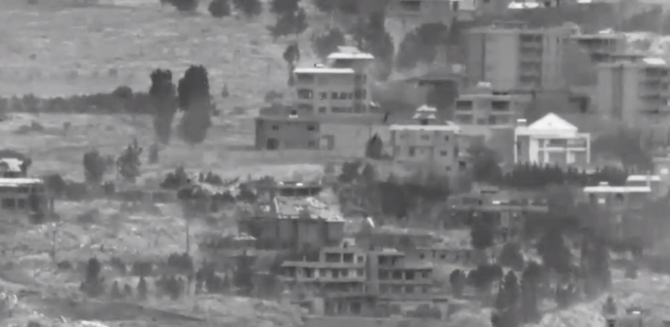
- GPS interference affecting both sides of Lebanese border, source says
BEIRUT: Two Hezbollah fighters were killed on Wednesday as Israel intensified strikes on south Lebanon following an attack by the Iran-backed group that wounded 14 Israeli soldiers.
Israel and Hezbollah have exchanged near-daily cross-border fire since Palestinian militant group Hamas attacked southern Israel on Oct. 7, triggering war in the Gaza Strip.
A security source said: “Hezbollah’s complex attack against the Israeli army in Wadi Al-Aramshe early on Wednesday, which led to the injury of 14 Israeli soldiers, including six with serious injuries, was absorbed by the Israeli side after the painful blow it directed at the party by assassinating three of its field officials.”
The Israeli army responded to the Wadi Al-Aramshe operation on Wednesday night by targeting the town of Iaat in the Bekaa Valley, 5 km from Baalbek. A drone strike hit a warehouse belonging to a member of the Al-Zein family, resulting in light wounds to one civilian.
Israel continues to jam GPS around the Lebanese southern border region, especially during military operations.
A security source said: “This interference negatively affects both the Israeli army and Hezbollah in targeting objectives.”
Hezbollah announced a series of operations since dawn on Thursday, targeting Israeli military sites opposite the Lebanese border.
The group targeted an Israeli force attempting to withdraw a military vehicle that was targeted on Wednesday at Metula, opposite the Lebanese town of Kfarkela.
At dawn, Israeli soldiers in Al-Malikiyah, opposite the Lebanese town of Aitaroun, were targeted by Hezbollah using missiles.
The group also targeted Israeli soldiers in Al-Marj.
“After careful monitoring and anticipation of the enemy’s movement at Al-Marj … they were targeted with missile weapons and suffered a direct hit; some died while others were injured,” the group said in a statement.
Hezbollah attacked Israeli soldiers using missiles in the Hanita forest, opposite the Lebanese town of Alma Al-Shaab.
On Thursday, the party mourned two members killed in Wednesday night’s shelling of Kfarkela. Mohammed Jamil Al-Shami from Kfarkela and Ali Ahmed Hamadeh from Doueir were killed in the Israeli operation.
The Israeli army targeted Lebanese towns with heavy shelling until dawn on Thursday. The town of Khiam was a priority target; correspondents in the area counted seven strikes and 128 artillery and phosphorous shells impacting between 8 p.m. and 4 a.m.
A young man from Habboush, Ahmed Hassan Al-Ahmed, was killed in the shelling and mourned by residents of his town.
Jets struck Hezbollah targets in Khiam, including infrastructure and two military buildings, the Israeli army said.
Israeli drones targeted a house on the outskirts of Markaba and in Blida on Thursday, with casualties reported.
The Israeli army also targeted Kfarkela with two missiles from a drone, and with artillery and phosphorous shells. From Metula opposite the border, Israeli soldiers combed the town with heavy machine guns.
The outskirts of Dhayra, Al-Bustan and Aita Al-Shaab were hit by gunfire from the Israeli position in Birkat Risha and other positions adjacent to the Blue Line.
German airline Lufthansa announced on Thursday it had extended the suspension of flights to Beirut and Tehran until April 30.
The decision was taken on the night of the Iranian attack on Israel last weekend.
UNIFIL spokesman Andrea Tenenti said that the organization’s peacekeepers “remain in their positions and carry out their duties, as well as our civilian staff.”
He added: “The safety and security of UN staff and their families are our priority.”


